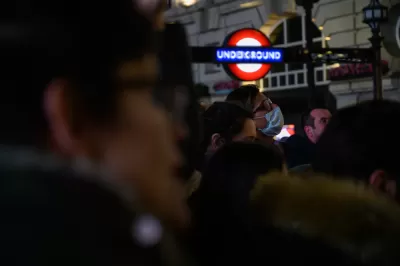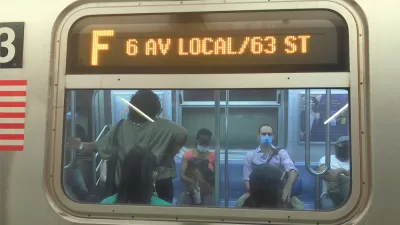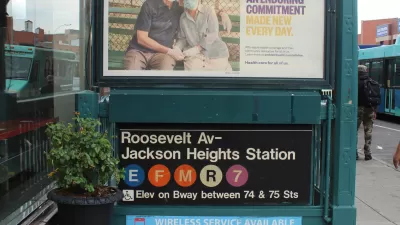Public transit cities around the world are operating well below pre-pandemic ridership levels, with many cutting service and no real clear idea about how and when a recovery will begin.

One of the first signs of the catastrophic consequences of the novel coronavirus in the United States in the spring of 2020 was the swift decline in public transit ridership. Since March 2020, U.S. transit agencies have cut service and sounded repeated alarms about a fiscal crisis and searched for ways to safely provide mobility options for essential and transit-dependent workers. Repeated infusions of relief funds from the federal government offer only a temporary reprieve from the fundamental realities of transit during the pandemic.
And transit isn't only struggling in the United States. As documented in a New York Times article authored by Somini Sengupta, Geneva Abdul, Manuela Andreoni, and Veronica Penney, a similar story is playing out in cities all over the globe.
In London, Piccadilly Circus station is nearly empty on a weekday morning, while in Delhi, the Metro ferries fewer than half of the riders it used to. In Rio, bus drivers are on strike, and in New York City, subway traffic is at just a third of normal volume.
The ongoing crisis facing public transit seems to compound concern. As noted in the article, the decline in transit ridership "spell disaster" for efforts to reduce public health risks like the greenhouse gas emissions that are causing climate change. "Public transit is a relatively simple remedy for urban greenhouse gas emissions, not to mention air quality, noise and congestion," according to the article.
The article seems primed for a deep dive, but stops short, probably because of the ongoing uncertainty about the questions of how to move to a post-pandemic normal. One source in the article, Mohamed Mezghani, head of the International Association of Public Transport, says transit systems should start upgrading transit systems now to attract riders back to transit in the future.
FULL STORY: After a year of the pandemic, public transit around the world is hanging by a thread.

Planetizen Federal Action Tracker
A weekly monitor of how Trump’s orders and actions are impacting planners and planning in America.

Congressman Proposes Bill to Rename DC Metro “Trump Train”
The Make Autorail Great Again Act would withhold federal funding to the system until the Washington Metropolitan Area Transit Authority (WMATA), rebrands as the Washington Metropolitan Authority for Greater Access (WMAGA).

DARTSpace Platform Streamlines Dallas TOD Application Process
The Dallas transit agency hopes a shorter permitting timeline will boost transit-oriented development around rail stations.

Supreme Court Ruling in Pipeline Case Guts Federal Environmental Law
The decision limits the scope of a federal law that mandates extensive environmental impact reviews of energy, infrastructure, and transportation projects.

Texas State Bills to Defund Dallas Transit Die
DART would have seen a 30% service cut, $230M annual losses had the bills survived.

Bikeshare for the Win: Team Pedals to London Cricket Match, Beats Rivals Stuck in Traffic
While their opponents sat in gridlock, England's national cricket team hopped Lime bikes, riding to a 3-0 victory.
Urban Design for Planners 1: Software Tools
This six-course series explores essential urban design concepts using open source software and equips planners with the tools they need to participate fully in the urban design process.
Planning for Universal Design
Learn the tools for implementing Universal Design in planning regulations.
Roanoke Valley-Alleghany Regional Commission
City of Mt Shasta
City of Camden Redevelopment Agency
City of Astoria
Transportation Research & Education Center (TREC) at Portland State University
US High Speed Rail Association
City of Camden Redevelopment Agency
Municipality of Princeton (NJ)




























